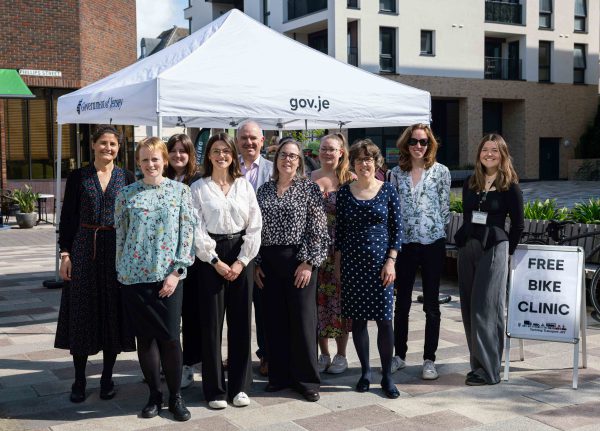
We often hear about climate change in terms of global headlines describing distant disasters, so we asked Jane Burns, Climate Change Engagement Manager, and Lisette Jones, Head of Environment and Climate, to explain what climate change looks like for our Island and what’s being done about it.
By extending the UK’s ratification of the Paris Agreement to Jersey, the Island made a binding international promise to reduce greenhouse gas emissions. “This puts us right in the heart of global efforts,” Lisette said.
Jane explained the difference between weather and climate. While weather is short-term, climate is the 30-year average. And Jersey’s long-standing records, going back to 1894, provide the evidence that our climate is changing.
Winters are getting warmer, and the nighttime minimum temperatures, are on average becoming warmer. When we experience a very much warmer nighttime period this can have health implications. “The body usually uses cooler nights to recover from the heat of the day, especially during the warmer months,” Jane explained. Plus, with each degree of warming, the atmosphere holds 7% more moisture. This results in potential heavier, or more rainfall, leading to the risk of more flooding events, especially when more rainfall falls over a shorter period. Summers, meanwhile, are becoming hotter and drier.
Farmers and birdwatchers are among the first to spot the changes: birds nesting earlier, some laying eggs twice per season. We’re also seeing more invasive species like the Asian hornet, and must remain vigilant as rising temperatures bring new environmental challenges.

The Environment and Climate Engagement teams
It’s a commonly-held belief among smaller communities that it should be up to countries like China and the US to tackle this issue, but Jane disagrees: “Almost everything we buy – our clothes, our food – comes from somewhere else,” she said. “We might not be making the emissions directly, but we are driving them through our consumption.”
Jersey’s financial services sector also plays a global role. Investment decisions made here can influence climate outcomes around the world.
The Carbon Neutral Roadmap is the government’s climate action plan created after declaring a climate emergency in 2019. It sets bold targets: a 68% emissions cut by 2030, and net zero by 2050, based on 1990 levels.
Lisette commented: “We’ve already reduced emissions by 47% between 1990 and 2022. There’s still a way to go, but the trajectory is positive.”
Initiatives include:
- Improved public transport, especially for school children – car use for school runs dropped from 53% in 2021 to 49% in 2024.
- Home energy audits to help people cut costs and emissions.
- Carbon literacy training for businesses, helping them understand and reduce their emissions.
Jersey’s biggest sources of emissions are transport (45% of emissions) and heating. “We need people out of petrol and diesel cars,” said Lisette, “and into active travel or public transport.”
Electric vehicle (EV) adoption is growing fast. A government grant scheme launched in August 2024 was so popular it closed early after issuing over 1,000 grants – many for second-hand EVs. This has helped make cleaner transport more accessible and reduce fuel use.
On the heating front, the government offers up to £9,000 in matched funding through the Low Carbon Heating Incentive. It helps Islanders switch to systems like air-source heat pumps and improve energy efficiency.
Jane highlighted the importance of climate education. This year, the team launched climate classrooms – Jersey-specific teaching resources – and last November, hosted the Island’s first Climate Summit for young people, building awareness and future readiness.
Careers are changing too and young people need to be equipped to thrive in a greener world. “If a student wants to be a mechanic, they’ll likely be fixing electric vehicles,” Jane explained.
Jane shared some simple, impactful ideas of changes individuals can make now:
- Drive more efficiently to use up to 15% less fuel.
- Cut food waste – which makes up 35% of our rubbish. Bread, milk, potatoes and yogurt are common culprits.
- Turn down the thermostat by 1°C to save energy and money.
Lisette added that retrofitting homes for energy efficiency is one of the biggest challenges – but also the biggest opportunities for reducing emissions long-term.
The government is also exploring offshore wind power. If approved, it could deliver renewable energy by the mid-2030s. “It would be the biggest infrastructure project the Island’s ever seen,” Lisette said. Work is underway to present a proposal to the States Assembly later this year.
Jane closed with a hopeful message: “We know change is hard, but we’re a strong community. If we come together, we can make Jersey even better – a healthier, more connected place to live, where we all benefit from cleaner air, lower bills, and a brighter future.”
Listen to the full Bailiwick Podcasts episode on Climate Change with Jane and Lisette here.
 blog.gov.je
blog.gov.je